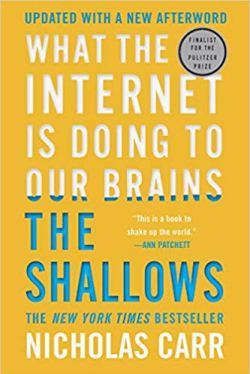Nicholas Carr's Blog, page 6
November 3, 2021
Meanings of the metaverse: Secondary embodiment

What’s with the bike, Mark?
You: “Hey Nick, will I be able to bring my body into the metaverse?”
Me: “You bring your body into your dreams, don’t you?”
Even today, nearly two years into the pandemic, one holds onto certain expectations about how a Big Tech company’s Big Reveal event will unfold. There will be flashing lights. There will be loud, bass-heavy music. There will be a crowded auditorium. The CEO, dressed in some version of Steve Jobs garb, will stroll onto a large stage. The audience ...
October 31, 2021
Meanings of the metaverse: Productizing reality

Welcome, Earthlings.
Facebook, it’s now widely accepted, has been a calamity for the world. The obvious solution, most people would agree, is to get rid of Facebook. Mark Zuckerberg has a different idea: Get rid of the world.
Cyberutopians have been dreaming about replacing the physical world with a virtual one since Zuckerberg was in Oshkosh B’gosh overalls. The desire is rooted in misanthropy — meatspace, yuk — but it is also deeply idealistic, Platonic even. The world as we know it is messy ...
October 25, 2021
The mailbox and the megaphone
Now that it’s broadly understood that Facebook is a social disease, what’s to be done? In “How to Fix Social Media,” an essay in the new issue of The New Atlantis, I suggest a way forward. It begins by seeing social media companies for what they are. Companies like Facebook, Google, and Twitter are engaged in two very different communication businesses. They transmit personal messages between individuals, and they broadcast information to the masses. They’re mailbox, and they’re megaphone. The ...
June 24, 2021
Are you still there?
Late Tuesday night, just as the Red Sox were beginning a top-of-the-eleventh rally against the Rays, my smart TV decided to ask me a question of deep ontological import:
Are you still there?
To establish my thereness (and thus be permitted to continue watching the game), I would need to “interact with the remote,” my TV informed me. I would need to respond to its signal with a signal of my own. At first, as I spent a harried few seconds finding the remote and interacting with it, I was a...
December 31, 2020
Not being there: from virtuality to remoteness
I used to be virtual. Now I’m remote.
The way we describe our digitally mediated selves, the ones that whirl through computer screens like silks through a magician’s hands, has changed during the pandemic. The change is more than just a matter of terminology. It signals a shift in perception and perhaps in attitude. “Virtual” told us that distance doesn’t matter; “remote” says that it matters a lot. “Virtual” suggested freedom; “remote” suggests incarceration.
The idea of virtuality-as-li...
September 27, 2020
What is it like to be a smartphone?
“The fact that we cannot expect ever to accommodate in our language a detailed description of Martian or bat phenomenology should not lead us to dismiss as meaningless the claim that bats and Martians have experiences fully comparable in richness of detail to our own.” –Thomas Nagel
What is it like to be a smartphone? In all the chatter about the future of artificial intelligence, the question has been glossed over or, worse, treated as settled. The longstanding assumption, a reflection of the a...
May 28, 2020
The love that lays the swale in rows
There’s a line of verse I’m always coming back to, and it’s been on my mind more than usual these last few months:
The fact is the sweetest dream that labor knows.
It’s the second to last line of one of Robert Frost’s
earliest and best poems, a sonnet called “Mowing.” He wrote it just after the
turn of the twentieth century, when he was a young man, in his twenties, with a
young family. He was working as a farmer, raising chickens and tending a few
apple trees on a small plot of land his g...
January 28, 2020
The Shallows: tenth anniversary edition

My book The Shallows: What the Internet Is Doing to Our Brains turns ten this year, and to mark the occasion, my publisher, W. W. Norton, is publishing a new and expanded tenth-anniversary edition. It will be out on March 3.
Along with a new introduction, the new edition includes, as an Afterword, a new chapter that explores relevant technological and cultural developments over the last decade, with a particular focus on the cognitive and behavioral effects of smartphones and social media....
January 13, 2020
From context collapse to content collapse

When social media was taking shape fifteen-odd years ago, the concept of “context collapse” helped frame and explain the phenomenon. Young scholars like Danah Boyd and Michael Wesch, building on the work of Joshua Meyrowitz, Erving Guffman, and other sociologists and media theorists, argued that networks like Friendster, MySpace, YouTube, and, later, Facebook and Twitter were dissolving the boundaries between social groups that had long shaped personal relations and identities. Before social...
January 4, 2020
TikTok and the coming of infinite media

If Instagram showed us what a world without art looks like, TikTok shows us what a world without shame looks like. The old virtues of restraint — modesty, discretion, taste — are gone. There is only one virtue: to be seen. The future has arrived, but you don’t get fifteen minutes of fame. You get fifteen seconds.
The rise of TikTok heralds something bigger, though: a reconfiguration of media. As mass media defined the twentieth century, so the twenty-first will be defined by infinite media....




